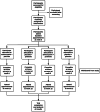The INHABIT (synergIstic effect of aNtHocyAnin and proBIoTics in) Inflammatory Bowel Disease trial: a study protocol for a double-blind, randomised, controlled, multi-arm trial
- PMID: 38282655
- PMCID: PMC10808876
- DOI: 10.1017/jns.2023.113
The INHABIT (synergIstic effect of aNtHocyAnin and proBIoTics in) Inflammatory Bowel Disease trial: a study protocol for a double-blind, randomised, controlled, multi-arm trial
Abstract
Ulcerative Colitis (UC), a type of Inflammatory Bowel Disease (IBD), is a chronic, relapsing gastrointestinal condition with increasing global prevalence. The gut microbiome profile of people living with UC differs from healthy controls and this may play a role in the pathogenesis and clinical management of UC. Probiotics have been shown to induce remission in UC; however, their impact on the gut microbiome and inflammation is less clear. Anthocyanins, a flavonoid subclass, have shown anti-inflammatory and microbiota-modulating properties; however, this evidence is largely preclinical. To explore the combined effect and clinical significance of anthocyanins and a multi-strain probiotic, a 3-month randomised controlled trial will be conducted in 100 adults with UC. Participants will be randomly assigned to one of four groups: anthocyanins (blackcurrant powder) + placebo probiotic, probiotic + placebo fruit powder, anthocyanin + probiotic, or double placebo. The primary outcome is a clinically significant change in the health-related quality-of-life measured with the Inflammatory Bowel Disease Questionnaire-32. Secondary outcomes include shotgun metagenomic sequencing of the faecal microbiota, faecal calprotectin, symptom severity, and mood and cognitive tests. This research will identify the role of adjuvant anti-inflammatory dietary treatments in adults with UC and elucidate the relationship between the gut microbiome and inflammatory biomarkers in this disease, to help identify targeted individualised microbial therapies. ANZCTR registration ACTRN12623000630617.
Keywords: Anthocyanins; Clinical trial; Gut microbiota; Inflammation; Inflammatory Bowel Disease; Polyphenols; Probiotics; Randomised controlled trial; Ulcerative Colitis.
© The Author(s) 2024.
Figures
Similar articles
-
A randomised, double-blind, placebo-controlled trial of a multi-strain probiotic in patients with asymptomatic ulcerative colitis and Crohn's disease.Inflammopharmacology. 2019 Jun;27(3):465-473. doi: 10.1007/s10787-019-00595-4. Epub 2019 May 3. Inflammopharmacology. 2019. PMID: 31054010 Free PMC article. Clinical Trial.
-
Fecal transplantation for treatment of inflammatory bowel disease.Cochrane Database Syst Rev. 2018 Nov 13;11(11):CD012774. doi: 10.1002/14651858.CD012774.pub2. Cochrane Database Syst Rev. 2018. Update in: Cochrane Database Syst Rev. 2023 Apr 25;4:CD012774. doi: 10.1002/14651858.CD012774.pub3. PMID: 30480772 Free PMC article. Updated.
-
Effects of soy milk consumption on gut microbiota, inflammatory markers, and disease severity in patients with ulcerative colitis: a study protocol for a randomized clinical trial.Trials. 2020 Jun 23;21(1):565. doi: 10.1186/s13063-020-04523-8. Trials. 2020. PMID: 32576228 Free PMC article.
-
Assessing the efficacy and safety of fecal microbiota transplantation and probiotic VSL#3 for active ulcerative colitis: A systematic review and meta-analysis.PLoS One. 2020 Mar 17;15(3):e0228846. doi: 10.1371/journal.pone.0228846. eCollection 2020. PLoS One. 2020. PMID: 32182248 Free PMC article.
-
The Microbiome as a Therapy in Pouchitis and Ulcerative Colitis.Nutrients. 2021 May 23;13(6):1780. doi: 10.3390/nu13061780. Nutrients. 2021. PMID: 34071065 Free PMC article. Review.
Cited by
-
Efficacy and Safety of Anthocyanin-Rich Extract in Patients with Ulcerative Colitis: A Randomized Controlled Trial.Nutrients. 2024 Dec 4;16(23):4197. doi: 10.3390/nu16234197. Nutrients. 2024. PMID: 39683589 Free PMC article. Clinical Trial.
-
Development and Evaluation of Bioconverted Milk with Anti-Microbial Effect against Periodontal Pathogens and α-Glucosidase Inhibitory Activity.Microorganisms. 2024 Jun 25;12(7):1290. doi: 10.3390/microorganisms12071290. Microorganisms. 2024. PMID: 39065059 Free PMC article.
References
-
- (PwC) PA. Improving Inflammatory Bowel Disease Care Across Australia. Melbourne: PricewaterhouseCoopers Australia (PwC); 2013.
Publication types
MeSH terms
Substances
LinkOut - more resources
Full Text Sources
Medical


